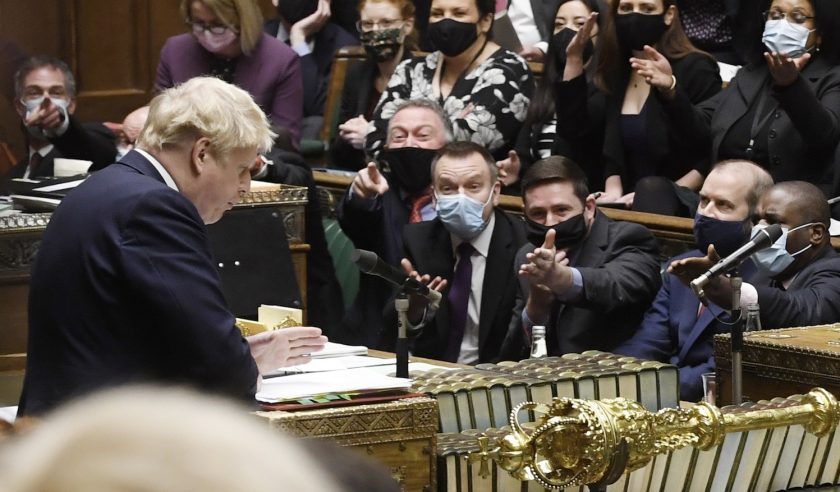Boris Johnson’s Downing Street party apology: three key takeaways

Following mounting pressure and incontrovertible evidence, prime minister Boris Johnson has for the first time admitted that he attended a gathering in the garden of Downing Street in May 2020 – during the UK’s first national COVID lockdown and at a time when group gatherings were prohibited.
Johnson started his weekly Prime Minister’s Questions by offering “heartfelt apologies”, saying that he knows the “rage” people feel with him and the government over perceptions that the “rules are not being properly followed” by those who make them. But what did we really learn from his appearance at PMQs? Here are three key takeaways that help reveal what’s really going on behind the apology.
1. Johnson is buying time
Numerous MPs have already demanded the prime minister resign over this scandal. At PMQs, Labour leader Keir Starmer said Johnson should “do the decent thing” and quit, noting that Matt Hancock resigned as health secretary when he broke the rules, as did his former adviser Allegra Stratton when a video emerged of her joking about one such party.
Nonetheless, the prime minister is clearly going to try to ride this one out. He has brushed off plenty of scandals in the past few years (see: Barnard Castle affair, business support for former lover Jennifer Arcuri, the Number 10 flat refurbishment, and so on).
In making a statement before parliament, Johnson tried to neuter his critics. It was a carefully worded admission that conceded mistakes but equally contained several key caveats on the nature of the May gathering – notably Johnson’s belief that it was a “work event”.
The prime minister then blocked all further avenues for discussion by deflecting every subsequent question from MPs with the insistence that they must wait for the outcome of the official inquiry into lockdown gatherings at Downing Street.
All this buys Johnson more time. If the inquiry report is not too damaging, it gives him wiggle room to claim it was an honest mistake. It creates distance between him and the revelations of the recent past. The storm might just blow over.
2. He is sorry – that he got caught
The ongoing saga of the potentially illegal gatherings at Downing Street has gone through many twists. Initially, Johnson denied the gatherings took place at all. When evidence to the contrary surfaced, he admitted there may have been gatherings but that all guidance was followed. When this line became untenable, Johnson switched to minimising his knowledge of events.
Now, in the latest turn, Johnson has been forced to admit that gatherings happened and that he was there. He claimed that he only attended for about 25 minutes to thank staff for their efforts but acknowledged that he “should have sent everyone back inside”. Although some have claimed they believe the apology is genuine, Starmer attacked it as a ruse conjured up after “months of deceit and deception”. Here, Starmer argued was “the pathetic spectacle of a man who has run out of road”.
Whether genuine or not, there is little doubt that this apology only occurred because Johnson had no other choice. The evidence was too strong and, had Johnson not started PMQs on the offensive, Starmer would have been in a position of significant strength. We will never now know what blows might have been landed had Johnson not proffered an admission of sorts. This way, he got to add in all the excuses he wanted.
In the end, the apology was a clever piece of oratory. It appeared to reveal contrition but was less about breaking the law than it was about perception. Johnson admitted that “it could have been said technically to fall within the guidance” but that he should have considered that “there would be millions and millions of people who simply would not see it that way.”
3. It did happen after all – but it wasn’t a party
Although Johnson has now admitted that there was a gathering and he was present at it, he still refuses to refer to it as a “party”. This, of course, plays into his narrative that it was a simple oversight and something that could happen to anyone. He wants to convince people that it was an accident that is now being blown out of proportion by the media and rival politicians.
Admitting wrongdoing – whether inadvertent or not – is a key shift in the situation. It’s rare for Johnson to concede any ground at all on matters of this kind. However, refusing to acknowledge it as a party is also important. Doing so would be the final step in admitting the law was broken. Instead, Johnson suggested that the garden at Number 10 is considered an “extension of the office” – one that has seen “constant use because of the role of fresh air in stopping the virus”.
Many members of the public will find this argument an extension of credulity, particularly when they look back on their own lives in May 2020. But it’s a lifeline for Johnson and we can be sure that he will stick to this argument like glue. If only he could demonstrate the same commitment to his own COVID regulations.![]()
By Chris Stafford, Doctoral Researcher, Politics and International Relations Department, University of Nottingham
This article is republished from The Conversation
Spotted something? Got a story? Email: [email protected]
Latest News
